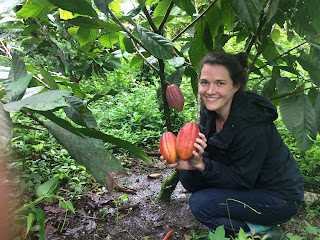For the Central Appalachians, including our home state of
West Virginia, the future needs to look very different from the past. The
region’s historic reliance on the coal industry to support family livelihoods,
and to support government services, no longer works. The future demands a new economic model, but
where do you get one? Professor Mike Rechlin weighs in on an innovative way he's led Future Generations in approaching this task...
 |
| Class members on the first day of the Sap Collection Residential |
You can start by looking at what works, and build on that success. You can replace the energy found in coal with the human energy to innovate. You can develop partnerships between not-for-profits, government and people eager to see change. If that sounds like part of the mantra of Future Generations University; well, that’s because it is. And maybe that’s why West Virginia’s newest University just might be in the “sweet spot” when it comes to the future and the Appalachians.
 |
| Participant Karen Milnes measuring trees with a diameter tape |
When Future Generations Graduate School Dean Mike Rechlin
retired from his duties on North Mountain, he planned on moving on up to his
home in New York State. Instead he moved
his activity up to the backside of Spruce Knob to help establish the Dry Fork
Maple Works. Seeing the potential for
growth of a new industry in the State, one that sustainably used a renewable
forest resource, Mike help organize the West Virginia Maple Syrup Producers
Association (WVMSPA). Fast forward 2
years, and applying that mantra of build on success, rely on human energy, and
develop partnerships, he is now helping the West Virginia Department of
Agriculture (WVDA) to develop this growing sector of the State’s economy. It’s also why Future
Generations University is partnering
with the WVDA and it’s Warriors and Veterans in Agriculture program to offer a
course titled Maple Sap Collection and
Syrup Processing.
This past September, Mike crisscrossed the State offering
seven Maple Syrup Production seminars
to over 75 interested participants.
Through partnerships developed by Future Generations University with the WVDA, the West Virginia Department of Veterans Assistance, the WVMSPA,
and West Virginia University, those interested in moving into this industry are
now enrolled in the Maple Sap Collection
and Syrup Processing Course.
Completing this course will require participants to enter into a
mentoring relationship with a syrup producer already successfully established
within the State. The seminars, the
course, and the WVMSPA are all driven by a palpable sense of human energy
eager to see change.
As course
participant and army veteran Jeremy Ray said last weekend at the courses first
residential, “nothing is happening in Nicholas County, where I live (and whose
property butts up against a closed coal mine). I just want to get something
going, to make it better.”
 |
| Crew members recording plot data |
When Mike Rechlin told the University's Director of Research, Mieke Schleiff, about this growing relationship between Future Generations and this maple syrup business, he let her know that the focus of
his course was on tree biology, evaporator chemistry, ecology, and math, not
SEED/SCALE. Fair enough, but stepping
back a bit to look at the big picture, it kind of looks like it is. And, it just might be that “sweet spot” where Future Generations University can apply its unique perspective to the future of
the Appalachians.
 |
| Alisha and Baby Oriana making use of a Biltmore Stick |
Interested in this unique learning and entrepreneurship opportunity? Visit https://learn.future.edu/local/staticpage/view.php?page=maple_cert or call the office at 304-358-2000 to find out more pricing and enrollment options!
____________________________________________________









